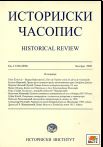Фрагменти из живота херцега Влатка Косаче
Fragments from the Life of Herceg Vlatko Kosača
Author(s): Đuro TošićSubject(s): History
Published by: Istorijski institut, Beograd
Keywords: Vlatko Kosača; Herceg; Margarita; Novi; Poljica; Radobilja; Rab
Summary/Abstract: After his father's death (in 1466), Herceg Vlatko spent most of his time in Herceg Novi, were he married for the second time, with the granddaughter of the Aragon King Alfonse V, Margarita Marzano (in 1474), and started a family. Together with his son-in-law, Ivan Crnojević, and with Dubrovnik's financial aid, he erected the church of St. Stephen. For the reasons that we do not know, this church was destroyed at the end of September 1475. He did not forget his nobles, the Kostanjić brothers, to whom Herceg Vlatko confirmed (in August 1475) the village of Drvenik with Perun, and admitted them into «the faith of the nobles» as long as they respect their obligations according to the Charter. In the late 1481, after he surrendered a part of the Herceg Novi fort by the sea to Turks, Herceg Vlatko, following some marital discord, left his «residence » in Novi, and until 1486 lived in the part of the Hum lands previously inhabited by the Kosačas and Vlatkovićs. Then he suddenly moved across the Cetina river into Poljice, and found himself in the Venetian territory, where, along with settling the payment of some old debts with Nikola Kamenarić from Šibenik, he spent some gloomy days in the Poljice Župa. Due to indecent behavior of some members of his entourage, Herceg Vlatko was «sent off» from there by the Split Providur, Fantono Coppio. Thus, the last Herceg after St. Sava, facing numerous problems in life, found himself in the island of Rab, which is still witnessed by the name of the Cape Kosača, and, enjoying hospitality of the local Crnota nobles, finally died there. He was survived by his widow Margarita, who soon found herself «in the marital embrace» of the well known Venice captain Marco Loredan, and several male and female children, of whom the youngest son, Jovan, was most likely, after reaching maturity, in 1505, enlisted into the Venice High Council, and continued to live in Venice.
Journal: Историјски часопис
- Issue Year: 2008
- Issue No: 56
- Page Range: 153-172
- Page Count: 20
- Language: Serbian

